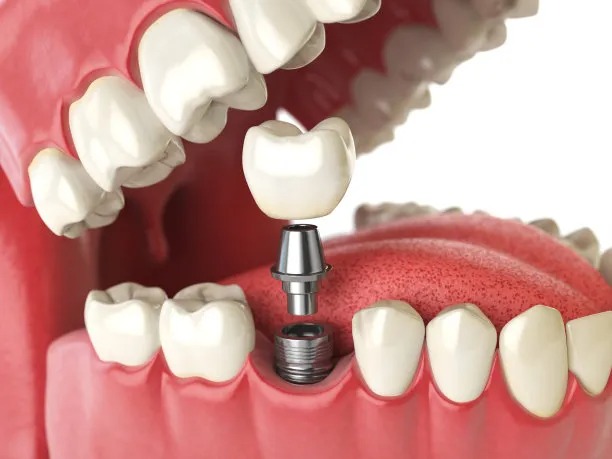Summary: Dental implant treatments have revolutionized restorative dentistry by offering a long-lasting solution for individuals seeking to restore their smiles after tooth loss. This article explores the significant benefits of dental implants, such as improved functionality and enhanced aesthetics. Additionally, it delves into the latest innovations in the field, including 3D imaging technology and advanced materials, which enhance the precision and effectiveness of treatments. With a focus on customized treatment plans and post-operative care, this article reviews how dental implants not only restore smiles but also improve the overall quality of life for patients. Ultimately, dental implants stand out as a premier option for those desiring a reliable and durable tooth replacement solution.
1. Comprehensive Benefits of Dental Implants

Dental implants provide an array of benefits that greatly enhance the lives of patients who have suffered from tooth loss. First and foremost, they restore full functionality, allowing individuals to eat their favorite foods without restrictions. Unlike dentures, which may slip or cause discomfort, implants are securely anchored to the jawbone, providing the stability needed for normal chewing and speaking.
Moreover, the aesthetic appeal of dental implants cannot be overlooked. They are designed to resemble natural teeth closely, offering a seamless integration into a patients smile. This is especially important for individuals who may feel self-conscious about missing teeth. The confidence boost that comes from having a complete smile can contribute significantly to ones overall mental well-being.
Lastly, dental implants help preserve bone structure in the jaw. When a tooth is lost, the jawbone can begin to deteriorate over time due to lack of stimulation. Implants serve as artificial roots that stimulate the jawbone, thereby preventing bone loss and maintaining facial structure.
2. Innovations Enhancing Implant Treatments
The field of dental implants is continuously evolving with the introduction of innovative technologies that enhance treatment outcomes. One significant advancement is the use of 3D imaging and cone beam computed tomography (CBCT), which allows dentists to visualize the bone structure of a patient’s mouth in precise detail. This technology helps plan out the exact placement of implants, leading to more predictable and successful outcomes.
Another innovation is the development of new materials for implant fixtures. Traditional titanium implants are being complemented or even replaced with innovative materials like zirconia. Zirconia implants offer a more aesthetic option, especially for individuals who are concerned about the visibility of metal in their mouths. These materials are biocompatible and provide excellent integration with jawbone.
Furthermore, advancements in techniques such as guided surgery have revolutionized the procedural aspects of implant placement. With guided surgery, dentists can use digital models to create surgical templates, ensuring that implants are placed with utmost precision, minimizing discomfort and recovery time for patients.
3. Customized Treatment Plans for Each Patient
Every patients dental needs are unique, and dental implant treatments are no exception. The development of personalized treatment plans is essential to achieving optimal results. During initial consultations, dental professionals conduct comprehensive assessments that include health history, imaging studies, and the specific preferences of the patient.
These evaluations lead to tailored treatment strategies that take into account factors like bone density, aesthetic desires, and budget considerations. This individualized approach is crucial for ensuring that each patient receives the right type of implant and the most effective care throughout the process.
Additionally, maintaining open and transparent communication throughout the treatment journey allows patients to feel more engaged and informed. This can alleviate anxiety related to dental procedures and enhance overall satisfaction with the results.
4. Importance of Follow-Up Care and Maintenance
Post-operative care is a vital component of the success of dental implant treatments. After the initial procedure, proper healing is essential to ensure that the implants integrate successfully with the jawbone. Dentists typically provide detailed aftercare instructions, including guidelines for oral hygiene and dietary adjustments during recovery.
Regular follow-up appointments are equally important. These check-ups allow dentists to monitor the healing process and ensure that no complications arise, such as infection or implant failure. Timely interventions can address issues early and maintain the health of the surrounding gums and bone.
Long-term maintenance of dental implants involves good oral hygiene practices and routine dental visits. Patients must commit to brushing, flossing, and potentially using antimicrobial solutions to keep their dental implants and surrounding tissues in optimal condition. By doing so, they can enjoy their restored smiles for many years to come.
Summary:
In summary, dental implants offer numerous advantages, including enhanced functionality and aesthetics. Innovations in technology continuously improve treatment precision, while customized plans cater to individual patient needs. A commitment to follow-up care and maintenance ensures the longevity of the results, allowing patients to enjoy their lasting smiles. Ultimately, dental implants represent a reliable solution for smile restoration, making them a standout option for tooth replacement.
This article is compiled by Vickong Dental and the content is for reference only.
Vickong Dental
Vickong Dental is a large medical group established in Hong Kong in 2008 by professors from well-known medical universities in Guangdong and Hong Kong, as well as medical doctors from key national '985' universities (including Master's supervisors and senior professors). The chain of branches brings together expert dentists with PhDs and Master's degrees from Hong Kong and Mainland China, committed to providing high-quality dental treatment.
"Vickong Dental Practices the University Motto of 'Healing and Serving Society,' with a Stable Operation for Sixteen Years. It Has Been honored with Hong Kong Enterprise Leaders's Choice,' and is a Global Trusted Implant Center for the Nobel Implant System. Recommended by Hong Kong Metro Broadcast and Guangdong Television, it Serves Customers from Over Thirty Countries and Regions, Gaining the Trust and Favor of Citizens from the Guangdong-Hong Kong-Macau Greater Bay Area and Surrounding Cities.

Thousands of customers' unanimous praise
The most recognized and highly recommended dental service by customers in the Guangdong-Hong Kong-Macau Greater Bay Area
We Ensure You Receive Detailed Care and Attention Here
Hong Kong standards, Shenzhen prices, Your Trusted English-speaking dentists

Vickong Dental Medical-Grade Instrument Disinfection Process
Vickong Dental Medical-Grade Instrument Disinfection Process

Vickong Dental Chain: A Warm and Comfortable Environment for Treatment






Appointment Hours

Q&A
Why choose Vickong Dental?
Vickong Dental practices the university motto 「Medicine to Benefit Society」, with each branch bringing together highly qualified dentists with doctoral and master’s degrees from Hong Kong and the Mainland, and has maintained seventeen years of steady operation。Recipient of 「2024 Hong Kong Enterprise Leaders Brand」, 「2025 Hong Kong Enterprise Leaders Brand」, a Nobel Biocare Global Trusted Implant Center, and a brand recommended by Metro Radio Hong Kong and Guangdong TV。
To date, we have served customers from more than thirty countries and regions,earning exceptionally high word-of-mouth recognition and trusted recommendations from residents across the Guangdong-Hong Kong-Macao Greater Bay Area and surrounding cities
We have eight major branches in Zhuhai、Shenzhen,and a consultation and service assurance center in Hong Kong,so you can book a free consultation at any time for any questions,which is very reassuring.
If I do not accept the quotation after the CT scan, will I be charged??
No! As long as the actual treatment has not started, you will not be charged any fees.
Will there be any additional charges during the treatment process?
No, there won’t be any additional charges. Before treatment begins, we will clearly explain the treatment plan and its corresponding fees. Only after the patient agrees and signs the consent form will we proceed with the dental service.
Can I pay in Hong Kong dollars?
Yes. Vickong Dental accepts payment in Hong Kong dollars. The amount will be converted based on the exchange rate of the day, and the applicable rate will be clearly communicated to you in advance.
Can I reschedule my appointment at any time?
Yes. Please contact us via **WeChat** or **WhatsApp** as early as possible, providing your original appointment time and details, along with your preferred new date and time slot for rescheduling.













